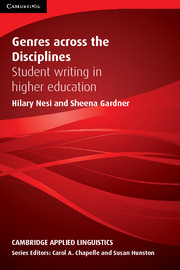Book contents
- Frontmatter
- Contents
- Series editors’ preface
- Abbreviations
- Acknowledgements
- Part I Investigating Student Writing: From Corpus to Genre Family
- 1 Investigating student writing with the BAWE corpus
- 2 Families of genres of assessed writing
- Part II Social Functions of University Student Writing
- 3 Demonstrating knowledge and understanding
- 4 Developing powers of informed and independent reasoning
- 5 Developing research skills
- 6 Preparing for professional practice
- 7 Writing for oneself and others
- 8 Networks across genres and disciplines
- Appendices
- Index
5 - Developing research skills
Published online by Cambridge University Press: 07 January 2021
- Frontmatter
- Contents
- Series editors’ preface
- Abbreviations
- Acknowledgements
- Part I Investigating Student Writing: From Corpus to Genre Family
- 1 Investigating student writing with the BAWE corpus
- 2 Families of genres of assessed writing
- Part II Social Functions of University Student Writing
- 3 Demonstrating knowledge and understanding
- 4 Developing powers of informed and independent reasoning
- 5 Developing research skills
- 6 Preparing for professional practice
- 7 Writing for oneself and others
- 8 Networks across genres and disciplines
- Appendices
- Index
Summary
Typically holders of an honours degree will be able to apply the methods and techniques that they have learned to review, consolidate, extend and apply their knowledge and understanding, and to initiate and carry out projects.
(QAA, 2008: 19)For some students the aim of demonstrating ‘an ability to deploy accurately established techniques of analysis and enquiry within a discipline’ (QAA, 2008: 18) involves developing arguments as in Essay genres, whereas for others greater emphasis is placed on conducting empirical studies, on solving practical problems, and on the ability to ‘apply the methods and techniques that they have learned to review, consolidate, extend and apply their knowledge and understanding, and to initiate and carry out projects’ (QAA, 2008: 19). This chapter focuses on ways in which students prepare for and demonstrate their abilities to initiate and carry out projects in their respective disciplines, with specific reference to the genre families of Research Reports, Literature Surveys and Methodology Recounts.
Developing Research Skills
Perhaps because there is an abundance of professional research writing available to students, less attention has been paid to training students to write research reports than to write essays. Published literary essays by Hazlitt, Montaigne, Will Self or other essayists bear little resemblance to student essays in purpose or nature. This, together with the quantities of essays written, the fact that students seldom see other people’s essays, and the wide distribution of essays across the academy, helps to explain why textbooks for developing student writing focus on essays (Tribble, 2009). In contrast, examples of research articles are readily available in academic journals, and there has been a productive line of inquiry in Applied Linguistics that analyses reported research that broadly follows the Introduction–Methodology–Results–Discussion (IMRD) framework (e.g., Swales, 1990; Lewin, Fine and Young, 2001). Students across the Sciences in particular are expected to read such professional research reports published in academic journals. In some cases journal articles are presented as models for student writing, and assignments from disciplines, such as Biology and Hospitality, Tourism and Leisure Management, appear in the guise of journal articles with volume and page numbers, acknowledgements, keywords and formatting such as double columns and fonts associated with published work in their disciplines.
As a Physics lecturer explained, ‘We’re trying to get them to write like a scientific paper, as would be published in a scientific journal, but for an audience of their peers’.
- Type
- Chapter
- Information
- Genres across the DisciplinesStudent Writing in Higher Education, pp. 134 - 169Publisher: Cambridge University PressPrint publication year: 2012



